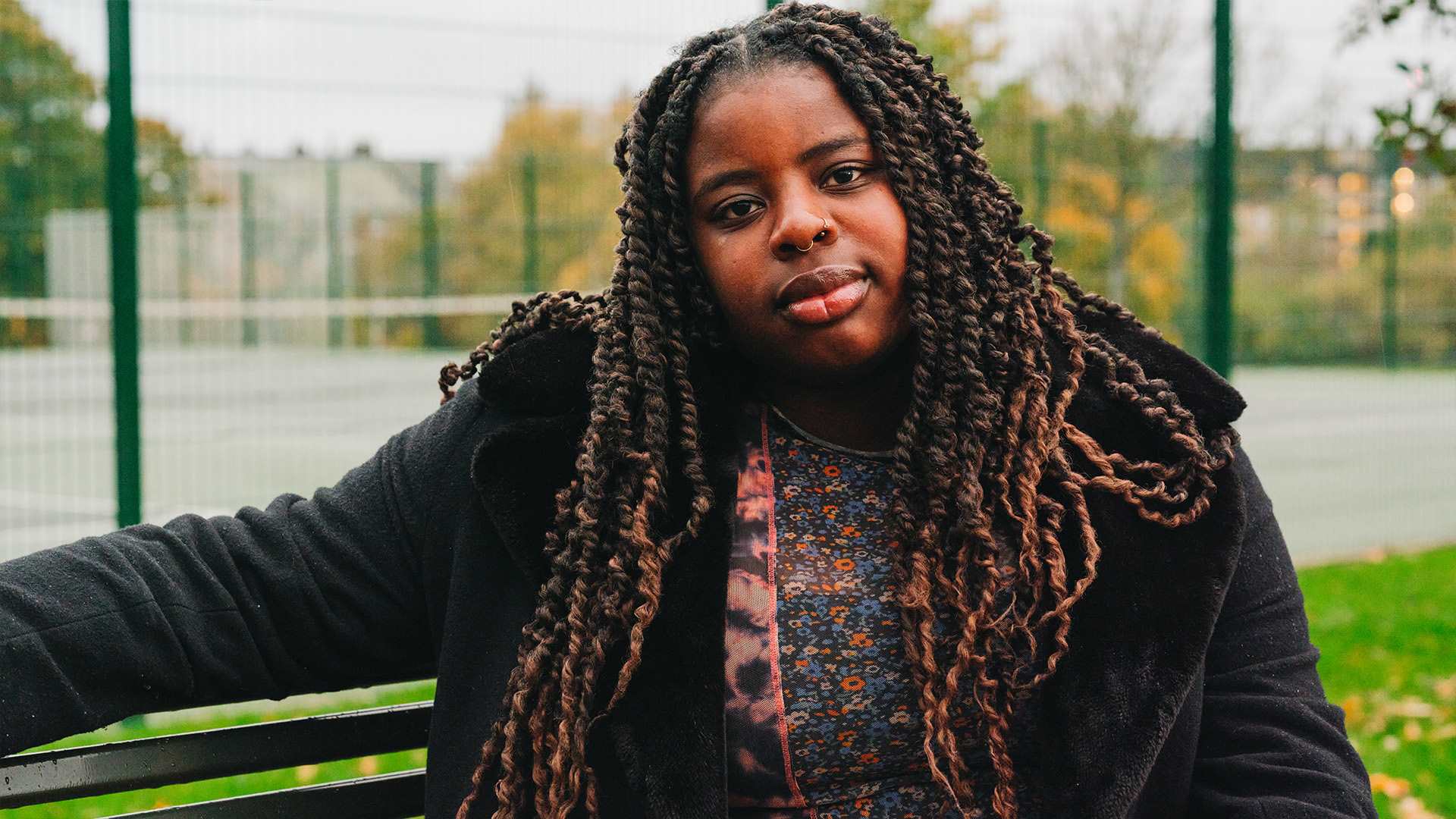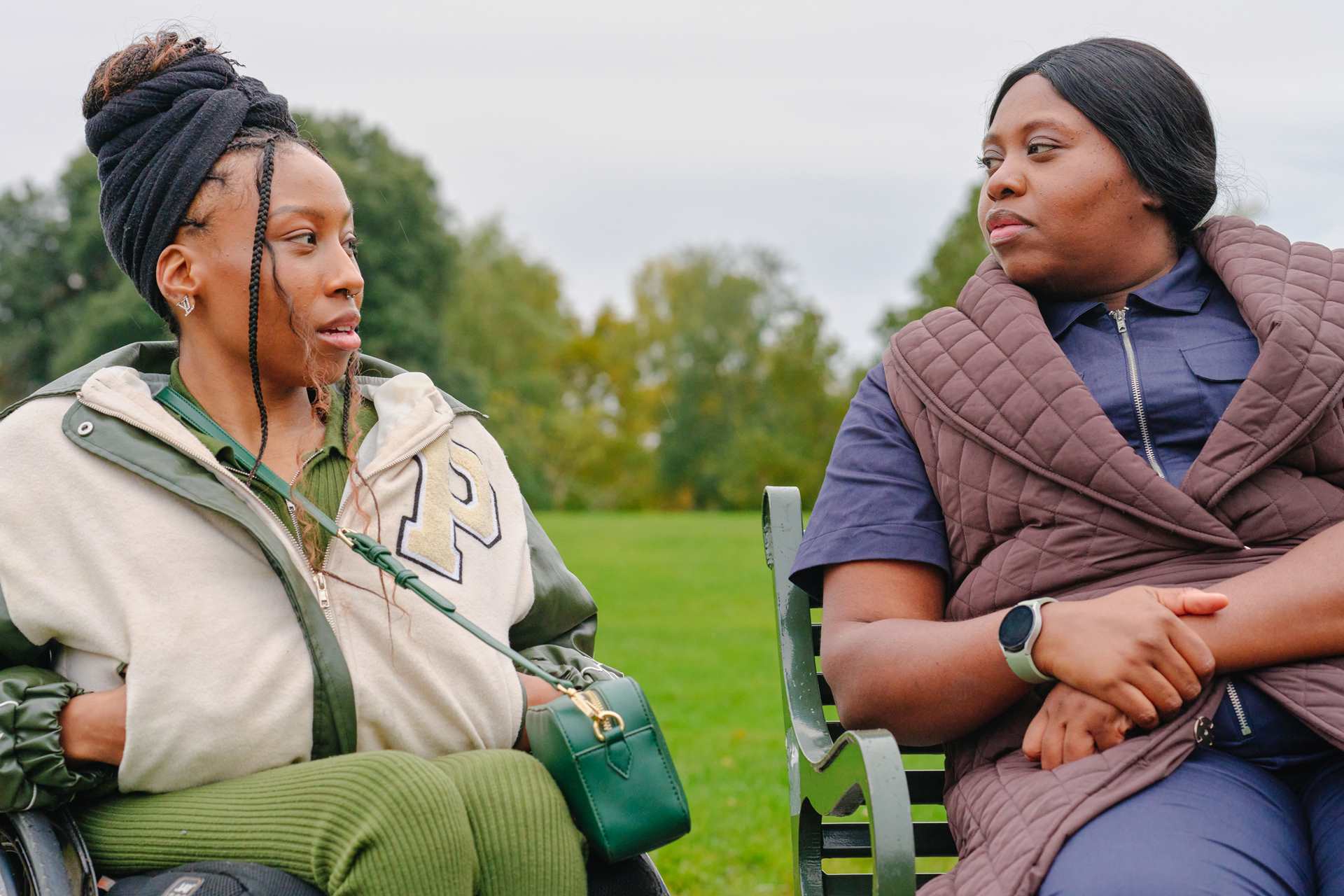What is schizophrenia?
Schizophrenia is a mental health condition that affects how you think, act and experience the world. During an episode, your reality can be totally different from someone else’s – this is what we call psychosis. You might see, hear or believe things that nobody else does, but it feels real to you. You can also feel mixed up, down or just want to be on your own.
Schizophrenia is a serious illness. Even though you might not have schizophrenia symptoms all the time, the condition itself doesn’t just disappear. But there’s lots of help and treatment options out there – and we’re here to help you find them.
With the right support, people with schizophrenia can manage their symptoms and enjoy happy lives, whatever that looks like for them.
Schizoaffective disorder isn’t the same as schizophrenia, but its symptoms are similar to bipolar disorder and schizophrenia.
The word schizoaffective has two parts:
- ‘Schizo’ means psychosis - seeing or believing things nobody else does.
- ‘Affective’ means mood symptoms - mania (highs) or depression (lows).
Unlike schizophrenia, some people only experience schizoaffective disorder once. For others, it can come and go, and it’s often triggered by things like stress.
Being diagnosed with schizoaffective disorder was scary because I had never heard of it before and didn't know anybody else with it. But after researching it, everything made sense, and I wasn't as scared anymore. If you have a mental health diagnosis, it's important to remember that your diagnosis doesn't define you.
Myths and misconceptions about schizophrenia
There’s loads of false information out there about schizophrenia as it’s a misunderstood condition. We’ve chosen some common myths to help you understand it better:
Truth: People with schizophrenia don’t have a split personality or multiple personalities. It’s more about a ‘split’ in how they experience reality, not their personality.
Truth: It’s not super common, but psychosis is more common than you’d think. About one in 100 people get diagnosed with schizophrenia, so there’s probably around 500,000 people with schizophrenia in the UK.
Truth: People with schizophrenia are not usually dangerous. They’re more likely to be victims or to hurt themselves than to hurt others.
Truth: While there’s no cure, there’s treatment and support out there. You can still live a regular life, whatever that means for you. Sometimes you might just need that extra help – and who doesn’t from time to time?
Schizophrenia symptoms
For symptoms of schizophrenia, there are two main groups: positive and negative. But it’s not about ‘good’ or ‘bad’.
Positive symptoms ‘add’ to your experience by changing your thoughts and behaviour. Negative symptoms ‘take away’, like making you feel disconnected from the world around you.
- seeing, feeling, smelling or hearing voices or sounds that others don’t (hallucinations)
- having beliefs that sound unreal to others (delusions), like thinking there’s a conspiracy against you
- muddled thinking
- a feeling that someone or something else is controlling you
- not feeling up to your usual stuff, like washing, dressing or seeing friends
- feeling flat and emotionless
- struggling to focus
- losing interest in life
Auditory – hearing voices or sounds that nobody else can.
Visual – seeing things that other people don’t, like objects, shapes, people or lights.
Somatic/tactile – feeling touches or movements on or inside your body, such as feeling insects on your skin.
Olfactory – smelling things that aren’t around you.
Gustatory – tasting strange things, like metal, rust or salt.
Getting help for schizophrenia
You can still live a happy and healthy life with a schizophrenia diagnosis, even if you continue to have symptoms. But getting the right help is key.
If you think you have schizophrenia, talk to someone you trust straight away – whether it’s a teacher, family, faith leader, counsellor or friend. If talking’s tough, try writing things down for them instead.
Also see your GP as soon as possible. They can refer you to Child and Adolescent Mental Health Services (CAMHS) or to a mental health specialist, like a psychiatrist, who can help you.
Treatment for schizophrenia
Schizophrenia is usually treated with a mix of medication and therapy. Since everyone’s experience of schizophrenia is different, your treatment will be too. Your doctors will help find what works best for you.
The most common medications for schizophrenia are antipsychotic drugs, also known as neuroleptic drugs or major tranquilisers.
Medication can be a game-changer for some but not for others. You may find that antipsychotic drugs reduce your symptoms of psychosis a lot. But don’t stress if they don’t make you feel better. Lots of people try different medications before finding what suits them. Your doctor will help you figure this out.
It’s crucial to have all the facts when making decisions about medication. To find out more, look at our guide.
Talking therapy for schizophrenia is there to help you handle your symptoms, not to dismiss what you’re experiencing.
The most common type of talking therapy offered for treating schizophrenia is cognitive behavioural therapy (CBT). This type of therapy is about how your thoughts, feelings and behaviours are impacting your life, and changing them for the better. This could mean helping you to:
- cope with symptoms of psychosis
- cut down on stress
- deal with any medication side effects
Other options like arts and creative therapies or family intervention might be available too.
For more on different therapy types, read our guide.
If you’re having a severe schizophrenia episode, your doctors and care team might suggest hospital care. They’ll try to talk it through with you first and then encourage you to admit yourself to hospital. This might seem scary, but it’s to help you get better and stay safe.
If you’re not up for going to hospital, your care team might have to decide for you. This is called ‘sectioning’ or ‘compulsorily admission’. It’s quite rare and only happens if your schizophrenia episode puts you or others at risk.
You’ll stay in hospital until you’re better and your care team feel you are no longer at risk. But they might suggest you stay longer.
For more info on hospitalisation, read our guide to inpatient care.

Finding the right antipsychotic medication for me has been a long and difficult journey. Aripiprazole was the first medicine, chosen for its low side effect profile. But weight gain and exhaustion followed with little improvement in symptoms. Four other antipsychotic medicines later, I tried clozapine which saved my life.
Looking after yourself
It’s vital to get help for schizophrenia, but you can also do things to manage it yourself. It’s not about dealing with things alone – staying connected with people matters. And self-care can give you a boost in dealing with schizophrenia. Here are some tips to try:
Knowing the signs when you’re becoming unwell helps you manage your condition better. Think back to how you felt and behaved before your last episode and get your friends and family to help you make a list. Share it with the people in your life so they can help you spot any signs in the future.
The signs are different for everyone, but may include:
- not sleeping well
- feeling anxious
- feeling paranoid or fearful
- finding it hard to concentrate
- hearing quiet voices
There might be triggers that set these off, like certain activities or situations. Note these down in a diary to keep track of your mood.
If you notice any signs, tell someone like your friends, family, GP, or care team. They’re there to support you.
During a crisis, it’s tough to know and explain what you need. A crisis plan helps you prepare and decide on the right support. Get someone you trust, your care team or GP to help you put it together. You’ll have this information ready for when you might need it.
Here are some questions to think about when planning yours :
- Who can help you in a crisis?
- What signs tell you a crisis might happen?
- What things helps you in a crisis?
- What treatment do you prefer?
- What tasks worry you during a crisis that someone can help with, like chores, pets, bills, cooking, taking medication or school?
- Who are your useful contacts, like friends, family, medical professionals, or helplines?
For more advice, take a look at Mind’s guide on planning for a crisis.
Stick to a routine that’s kind on you and your body, and helps you manage schizophrenia symptoms, like:
- getting enough sleep
- avoiding drugs and alcohol
- eating well
- staying active
- paying attention to your stress levels
- resting when you need it
There are lots of grounding techniques to try as well, like the ones our blogger Kerry does when things get overwhelming.
Having schizophrenia can feel lonely and not everyone gets it, but there are loads of people who do. Connecting with other people who have schizophrenia can really help, reminding you that you are not alone in this.
Check out the Hearing Voices Network (HVN) to find a support group where people lift each other up. There are over 180 groups in the UK with ones for young people, women, and Black and minoritised people.
If group support isn’t your thing, there are helplines that you can contact. They are trained to listen, support you and help you figure things out. Two great examples are Samaritans and SANEline, and you can find more at the end of this guide.
How to support someone with schizophrenia
If someone you’re close to has schizophrenia, supporting them plays a huge role in helping them deal with it. Just being there and showing you love them goes a long way. But don’t stress about fixing everything – that’s not on you.
-
Learn about schizophrenia
They might find it hard to explain or open up about what’s happening. But taking the time to learn about schizophrenia can make you a better ally. It also lets them know you care and want to help.
-
Ask what they need
When in doubt, asking is the best place to start. It might be day-to-day things like shopping, GP appointments or helping with homework. Even a check-in text or spending time together can make all the difference.
-
Listen without judgement
Even if you don’t understand it, respect that their reality is real to them. Give them space to talk about what’s happening and reassure them that you’ve got their back.
-
Help lift their spirits
If they're feeling low or not their best, remind them of their strengths and encourage them to get back into doing what they love. But patience is key – they need to move at their own pace.
-
Find ways of communicating
If talking is tough, find creative ways to chat. You could try using traffic light cards for them to show you how they’re feeling: green for good, yellow for so-so, and red for a tough time. It’s a quick way for them to share without going into detail.
-
Plan for the rough patches
When they feel good, talk about what helps them when times get tough. They can write down any symptoms to look out for, triggers, and if there’s anything you can do to help.
Real stories about schizophrenia
Get help now
If you're struggling right now, you don't have to go through this alone. Here are some places where you can get help and support.
-
Samaritans
Whatever you're going through, you can contact the Samaritans for support. N.B. This is a listening service and does not offer advice or intervention.
- Opening times:
- 24/7
-
Childline
If you’re under 19 you can confidentially call, chat online or email about any problem big or small.
Sign up for a free Childline locker (real name or email address not needed) to use their free 1-2-1 counsellor chat and email support service.
Can provide a BSL interpreter if you are deaf or hearing-impaired.
Hosts online message boards where you can share your experiences, have fun and get support from other young people in similar situations.
- Opening times:
- 24/7
-
Youth Access
Provides information about local counselling and advice services for young people aged 11-25.
Put in your location and what you need help with into their 'Find help' search, and see what services are available in your area.

This page was reviewed in March 2024.
It was co-created by young people with lived experience of schizophrenia.
We will next review the page in 2027.
YoungMinds is a proud member of PIF TICK – the UK's quality mark for trusted health information.
Whether you love the page or think something is missing, we appreciate your feedback. It all helps us to support more young people with their mental health.
Please be aware that this form isn’t a mental health support service. If you are in crisis right now and want to talk to someone urgently, find out who to contact on our urgent help page.










